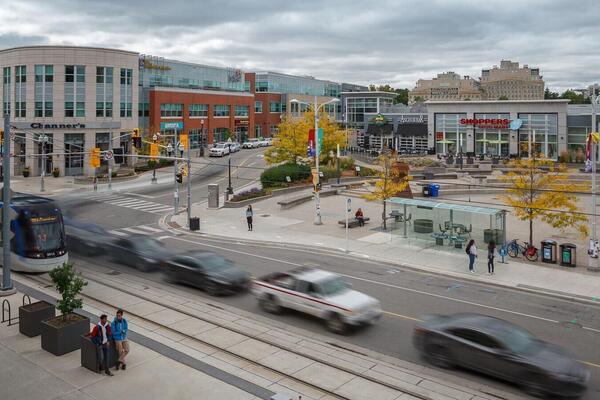
Connecting kids with nature for a greener future
UWaterloo volunteers help support environmental education at rare Charitable Research Reserve

UWaterloo volunteers help support environmental education at rare Charitable Research Reserve
By Beth Bohnert Office of AdvancementSplashing through a creek in her rubber boots. Creating leaf pattern transfers with crayons. Enjoying the outdoors with friends. These are just some of the happy memories University of Waterloo staffer Sophia Diebold has of her childhood experiences at the rare Charitable Research Reserve.
Rare is an urban land trust and environmental research institute protecting more than 1,200 acres of ecologically significant lands in Waterloo Region and Wellington County. Rare’s education programs sparked Diebold’s lifelong love of nature and interest in sustainability. So, when the Office of Advancement recently began looking for opportunities to help the local community through volunteerism, she suggested rare.
On September 18, a team of Advancement staff including Sophia, Mari-Beth Davis, Joanne Stewart and Phoebe Wong volunteered at rare’s 2024 Trail Party. This annual walk-run-hike raises funds for the organization’s conservation and education programs. The Advancement team was responsible for welcoming guests at the event’s registration table and serving the barbecue lunch.
“The Trail Party is a celebration of the lands we are stewarding, as well as an opportunity for participants to explore the natural areas we care for,” says Sara Clark, rare’s events and development coordinator.
This year, Trail Party participants raised more than $45,000 for rare’s Every Child Outdoors (ECO) environmental education program. ECO aims to build the next generation of conservationists by nurturing kids’ interest in the natural world. More than 22,500 students from Junior Kindergarten through grade 12 have participated in ECO camps, field trips and PD day activities.

Clockwise from top left: Advancement staff members Sophia Diebold, Mari-Beth Davis, Joanne Stewart and Phoebe Wong volunteered at the 2024 Trail Party to support environmental education at rare Charitable Research Reserve.
As Advancement professionals, team members have planned and hosted dozens of alumni and donor events. They know how vital volunteers are to the success of both events and the non-profit organizations that rely on them.
“Volunteering is an opportunity to give back in a meaningful way,” Davis says. “I volunteer in my community, and I know that many organizations are finding it more and more challenging in terms of funding and hands-on support.”
“We couldn’t run the Trail Party without our volunteers,” agrees Clark. “And we appreciate having people volunteer in groups because they create an even bigger impact.”
Besides the positive effect volunteerism has on non-profits, team members recognize the personal benefits too.
“Volunteering is a great way to connect with other people. If you're in a new location or region, you can meet like-minded people,” says Stewart. “Volunteering adds value to the community, but it also adds value to your life.”
Experiencing the Trail Party allowed the team to learn more about rare’s work.
Diebold notes that connections between and the University run deep. Waterloo researchers are involved in research projects at the reserve and these collaborations are contributing to the sustainable future envisioned in the Waterloo at 100 framework. In addition, Waterloo alumni work at rare and the organization employs our co-op students.
“We’re proud to partner with an organization like rare that does so much for both UWaterloo and the wider community,” Diebold says.
Photos: Sydney Daniels, University of Waterloo Environment student

Read more
Upside Robotics secures new funding to accelerate the future of sustainable farming

Read more
An ambitious research collaboration with Habitat for Humanity is reimagining home ownership across Waterloo Region and Canada

Read more
It Started in Waterloo: An Astronaut's Journey into the Universe of Innovation, narrated by Chris Hadfield, highlights the University of Waterloo’s role in igniting innovation within the region and beyond.
The University of Waterloo acknowledges that much of our work takes place on the traditional territory of the Neutral, Anishinaabeg, and Haudenosaunee peoples. Our main campus is situated on the Haldimand Tract, the land granted to the Six Nations that includes six miles on each side of the Grand River. Our active work toward reconciliation takes place across our campuses through research, learning, teaching, and community building, and is co-ordinated within the Office of Indigenous Relations.